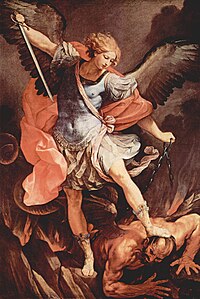This Sunday, September 29th,
is the Feast of Saint Michael and All Angels. I guess if I'm honest
I've never really given much thought to angels. I mean, they're
supposed to be messengers from God, but I've never personally
encountered one with shining wings and a halo and all that. This is
not to say, however, that I don't believe in them. Many world
religions speak of spirit beings or guides who are intermediaries
between God and humankind. I'm now too old NOT to believe in the
unseen. What does Hamlet say? “There are more things in Heaven and
Earth, Horatio, than are dreamt of in your philosophy.”
Traditionally, the Western Church has
celebrated this feast as Michaelmas.
It is considered to be the time of the harvest and the beginning of
autumn—the time when the books get balanced. As the leaves begin to
fall and the world begins to get colder and thoughts of the departed
and my own mortality fill my mind, I like to think that there might
be a heavenly spirit hovering over me, giving me benign guidance or,
at the very least, keeping me from screwing up too badly. Maybe it's
been the presence of angels which has brought me safely to this point
in life after all. Who knows?
For me, though, the
only angels I know are the flesh and blood messengers who speak
divine wisdom to me when I most need to hear it. God has been very
good to a poor dufus like me—a habitually lazy, unsuccessful actor
with a tendency towards excess. How could it be that I came to be
this beloved Lutheran pastor with a beautiful wife, comfortable home,
and a real sense of meaning in my life? There must have been some
guidance from beyond.
At different times,
God has placed people in my life who have given me wisdom, comfort,
and sometime financial support when I most needed it. I have angels
in my parish and among my circle of friends. At times my wife can be an angel. I even consider my shih
tzu dog an angel! (She really DOES remind me of God's love all the
time!)
I've only had one
really mysterious encounter. I was walking in Center City
Philadelphia one night many years ago just before I was to begin
duties at my present parish. I'd had a bad fall from a horse while
riding in Fairmount Park the week before, and I'd really sprained a
groin muscle. I was in pain and had a terrible limp. As I hobbled
down the sidewalk, I saw a heavy-set African American woman wrapped
in an old overcoat leaning against the wall of a storefront and
talking gaily to the passers-by. I assumed this woman to be a street
person, one of the many homeless pan-handlers one sees in downtown
Philly. I reached into my pocket for a dollar bill, certain I was
about to be accosted for a donation. The woman smiled at me and said,
“Look! You're Jacob, and the Lord has put your hip out of joint to
make you new!” I smiled and said something like, “I guess He
did.” After all, I was about to begin a new life as the pastor of
my church. The woman never asked me for money. I limped on a few more
steps and thought about how God had made a transformation in my life,
of how I had been wounded but blessed, of how the last few
years—which had included the death of my unborn child, the death of
a dear friend, the death of my mother, and a divorce—had made me
ready to take on the responsibilities of shepherding a congregation.
I turned around.
The woman had vanished.
+ + + +
PS- If you're Lutheran or Roman
Catholic, help celebrate the upcoming 500th anniversary of
the Protestant Reformation by making this plea for Christian unity.
Ask Pope Francis to let Lutherans and Catholics share the Holy Supper
once again. Just click here.




